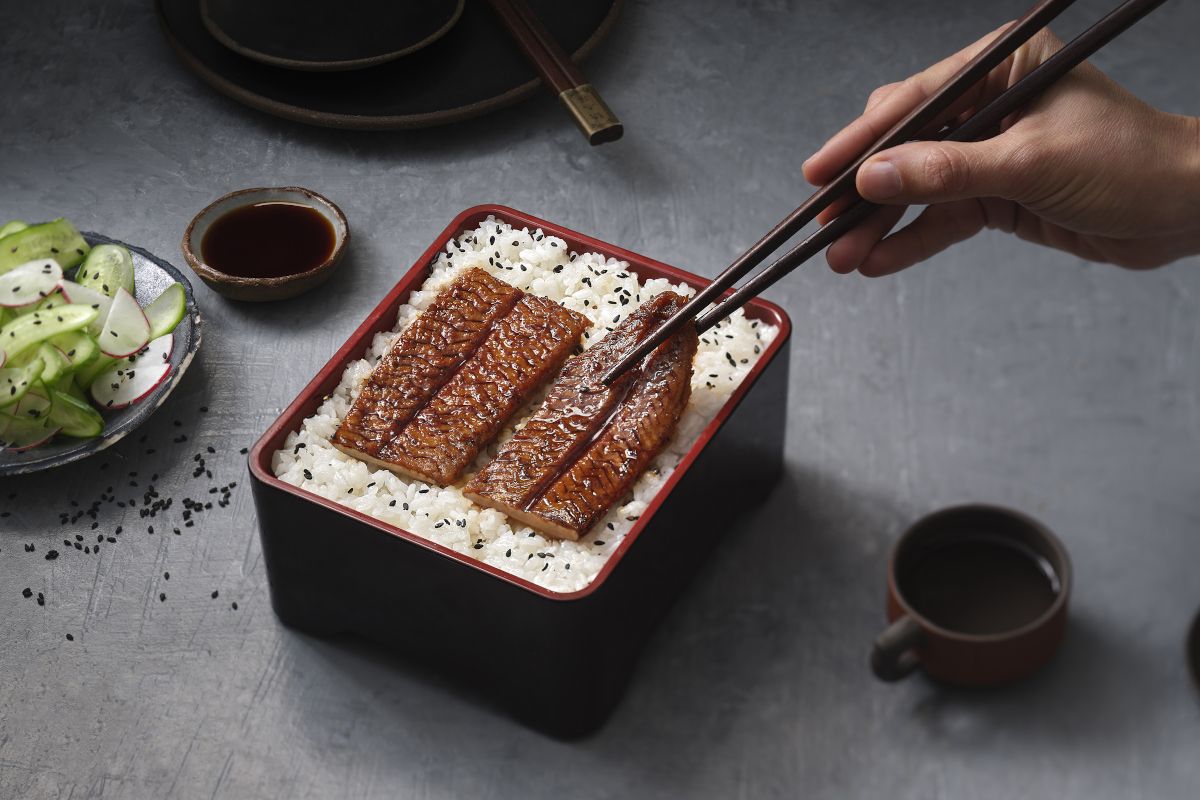Forsea has unveiled first cultured eel prototype in collaboration with famed Japanese chef
Forsea Foods, a cell-cultured seafood startup with a mission to save wild eel populations has unveiled its first prototype of cell-cultivated freshwater eel, replicating the traditional Japanese unagi eel.
Cultured eel unagi. Image courtesy of Forsea. Photo credit: Anatoly Michaello.

Forsea Foods (Rehovot, Israel), a cell-cultured seafood startup with a mission to save wild eel populations has unveiled its first prototype of cell-cultivated freshwater eel, replicating the traditional Japanese unagi eel. The company explains in a press release that it has collaborated with celebrated executive chef Katsumi Kusumoto to create two traditional Japanese dishes: unagi kabayaki (marinated grilled eel over rice) and unagi nigiri. Kusumoto’s vegan restaurant SAIDO in Tokyo was voted the world’s best vegan restaurant in 2019 by Happy Cow.
“Unagi is an enduring favorite in Japan,” said Kusumoto, in a press release. “Its timeless appeal, however, is impacted by a growing awareness among the Japanese population of the need to take a more sustainable approach. It’s been a thrilling journey to join forces with emerging innovators, and working together to deliver the traditional unagi indulgence with a clear eco-conscience.”
“This milestone marks a major leap in our journey to deliver delicious cultured seafood products,” said Roee Nir, CEO and co-founder of Forsea. “Forsea is pioneering the fusion of traditional, high-quality Asian cuisine with groundbreaking technology to create the world’s first cultured unagi — one that will provide the consumer with a genuine seafood experience without putting further strain on aquatic life.”
With a working proof-of-concept, and its collaboration with Kusumoto which will help further refine the taste and texture of the product, Foresea is now prepped to scale up production. According to Foresea, the company’s proprietary method makes it well suited for scalability. The company explains that it uses organoid technology that allows Foresea to create 3D microtissues composed to fat and muscle. Because the microtissues differentiate into edible cells, mimicking the natural process of cell formation, and cell lines self-organize into tissue structure without the need for scaffold support, the process simpler and allows for enhanced scalability. It’s also more cost-effective, decreasing the reliance on costly growth factors, says Forsea.
The company expects its inaugural product to be ready for commercial launch in 2025, and is currently seeking partners in Japan and across Asia, the European Union, and United States. In anticipation of the growing market, and to accelerate the company’s progress, Forsea has expanded its team by forming new engineering and food applications departments, and has appointed Mayu Sugisaki as business development manager in Japan.
Magnesium L-threonate, Magtein, earns novel food authorization in the European Union
December 19th 2024According to the announcement, the authorization is also exclusive to AIDP and its partner company and licensee, ThreoTech, meaning that they are the only parties that can market magnesium L-threonate in the EU for a period of five years.
Survey finds a lack of enthusiasm about AI technology among food and beverage consumers
December 12th 2024The survey, commissioned by Ingredient Communications and conducted by SurveyGoo, found that 83% of respondent agreed that companies should declare on product labels when a product has been designed or manufactured with the assistance of AI technology.